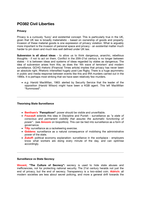Lecture notes
PO382 Revision Notes - Civil Liberties
- Institution
- The University Of Warwick (UoW)
Revision notes on Civil Liberties in Vigilant State. Topics covered: - Privacy - Theorising state surveillance - Surveillance vs state secrecy - Surveillance in practice - Detention and repression - Civil liberties
[Show more]



